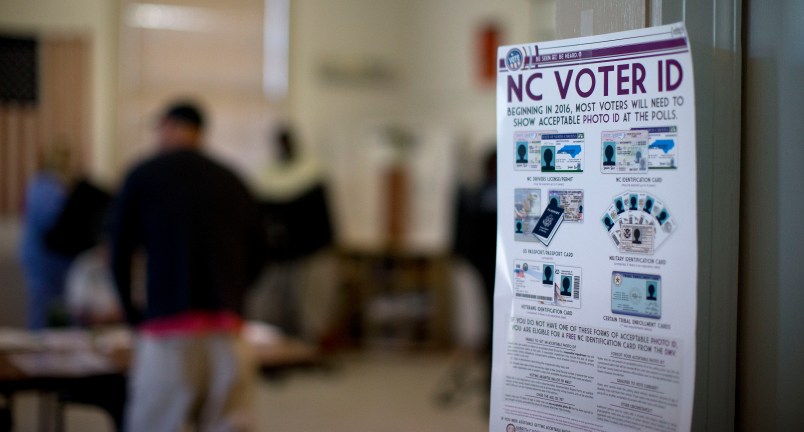Update at 5:13 p.m.: ACLU attorney Julie Ebenstein confirmed to TPM that the group and other organizations involved in the challenge to North Carolina’s 2013 voting restrictions have filed an appeal with the the 4th U.S. Circuit Court of Appeals of a district court’s decision upholding the law.
The voting right groups involved in a legal challenge to a bundle of North Carolina voting restrictions say they will move quickly to appeal the district court decision issued Monday that upheld the 2013 law.
An appeal, which could be filed as soon as today, would go to the 4th U.S. Circuit Court of Appeals, which in 2014 ruled in favor of the voting rights groups when they sought a preliminary injunction on some provisions of the law, a decision that was later overturned by the Supreme Court.
In his decision Monday, U.S. District Judge Thomas Schroeder upheld the law on the basis that North Carolina has “provided legitimate State interests” in implementing the restrictions. He said that when it came to those who said the law burden their ability to vote there was “strong evidence that some other reason is at play for the failure of these persons to register and/or vote.”
His 485-page decision was a exhaustive examination of the evidence presented in the high-profile trial the unfolded in July 2015 and January 2016
North Carolina’s NAACP, the League of Women Voters and other groups and individuals challenged the law, which they said violates the Voting Rights Act and the Constitution. The U.S. Department of Justice was also involved in the legal challenge, but the private attorneys working on the case told TPM they did not expect the Justice Department to make its next move as swiftly.
The lawsuit objected to a number of provisions in the 2013 legislation, which was only implemented after the Supreme Court’s Shelby County v. Holder decision gutting the Voting Rights Act. Before the decision, North Carolina was among the states required to get federal approval of changes to its voting regulations under the Voting Rights Act.
The lawsuit targeted the law’s voter ID requirement, its cutbacks to early voting, and its elimination of same-day registration, out-of-precinct voting and pre-registration for teenagers who will be 18 by the time of the next election.
Schroeder, in his opinion Monday, said the high rate of turnout — both generally and among minorities — in 2014’s mid-term election when the law was in effect undercut the challengers’ arguments that the law would make it harder for minorities and other North Carolinians to vote. He also pointed to remedies later put forward by legislators to soften the impact of the voter ID portion of the law and of the cutbacks in the number of days of early voting.
Schroeder wrote that, while the challengers proved that some African-Americans “endure socioeconomic disparities that can be linked to State discrimination and this may make it more difficult for them generally to participate in any electoral system,” they “failed to show that such disparities will have materially adverse effects on the ability of minority voters to cast a ballot and effectively exercise the electoral franchise” because of the law.
Additionally, Schroeder was very critical of some of the testimonies of the expert witnesses put up by the challengers.
Attorneys for the challengers were hopeful Tuesday that the appeals court would be skeptical of the district court’s legal reasoning. Allison Riggs, a senior attorney with Southern Coalition for Social Justice, which was representing some of the challengers, pointed specifically to the opinion’s reliance on 2014 turnout data. She said Schroeder also erred in how he assed the law’s cumulative effect
“In that sense, there are some real clear legal issues in there,” she told TPM.
With the 2016 general election a mere months away, the challengers will likely ask the circuit court to expedite the appeal, and it is expected that no matter what the appeals court eventually rules it will ultimately be appealed to the Supreme Court, which is currently down one justice. A four-four split would defer to the circuit court’s ruling.







Let me guess. Old white judge appointed by a Republican legislature 20+ years ago, has previously ruled on voting cases and always ruled for the RWer’s.
Amiright?
To be precise a GW Bush appointee.
The evil that men do lives after them;
The good is oft interred with their bones;
So let it be with Scalia.
It will take a while to undo the damage that a Scalia influenced SCOTUS and a GW Bush appointed judiciary has done.
Legislature’s don’t appoint federal judges. All federal judicial positions come from presidential nominations, with Senate approval or acquiesence.
What’s the weather like in the country you’re posting from?
Oh, your right my bad! Sorry I ruffled your RW feathers…you azzhole!
Chicago, IL USA enough for you, Sparky? Dork!